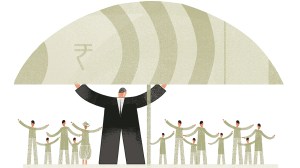Tackling the monster of economic sanctions
Sanction busting was the activity of the week. Indian industry, the Government and foreign lobbies worked hard to ensure that the impact of ...

Sanction busting was the activity of the week. Indian industry, the Government and foreign lobbies worked hard to ensure that the impact of economic sanctions is mitigated to the maximum extent possible.
Leading industrialist RP Goenka visited Japan; a CII delegation camped in London; while US lobbyists worked to reduce sanctions against India.
In the end there was some respite for India, even though the more stringent sanctions remained. The US Senate unanimously voted to lift agricultural sanctions imposed against India and Pakistan for their nuclear tests, but stripped the legislation of its most sweeping provisions in order to keep harsher trade embargoes in place.
Passing a Bill to this effect, senators yesterday voted 98 to 0 to exempt credit and guarantees provided by US authorities to support food and medicine exports from the arms export control act. However, the effort to give the President Bill Clinton authority to also exempt other trade sanctions till march next year, including Exim Bankloans and Overseas Private Investment Corporation guarantees, had to be postponed because Senator John Glenn and other legislators, including Senator Sam Brownback, wanted a review of sanctions against 91 countries.
The immediate beneficiaries of the bill will be grain farmers in the United States, who sell significant quantities of wheat to Pakistan. India buys almost no food from the United States although Washington has long been trying to break into the fairly well-protected Indian food market.
In fact, it transpires that the immediate provocation for the bill, which was rushed to the floor of Senate bypassing the usual passage through committees that reviews legislation, was an imminent transaction by Pakistan.
Islamabad has put out a word that it is planning to buy 350,000 metric tonnes of wheat in the open market. Panicky American farmers, who are said to be facing ruination due to a glut in the market and falling prices, began putting pressure on lawmakers to allow sales to Pakistan. The dealwill be worth $ 37 million.
In London CII had a tough time defending India. The dominant view among businessmen and bankers in UK, accepted by the CII, was of disappointment.
Following the nuclear tests British investors had greater expectations from the BJP government’s first budget and were disappointed to see the retractions or changes to certain budgetary proposals following its presentation to Parliament, for example the reduction in import duties from 8 per cent to 4 per cent, were not seen as "responsiveness" but as a sign of disarray.
The business delegation taken by Goenka to Japan had a better time. Several top Japanese businessmen pledged to continue with their investment plans in India as decided prior to the Pokharan blasts. They have further stated the investment climate in India will have to be improved and the reforms process speeded up to attract larger investments.
The team held fifteen one-to-one meetings with presidents of top Japanese conglomerates such as Mitsui, Mitsubishi,Marubeni, Sony and Itochu. The delegation also met with Exim Bank of Japan and Japan Rating Agency.
Falling exports
Exports continued their decline. They fell by 7.54 per cent during April-May 1998-99 compared to the same period of the previous year, with the cotton yarn and hardware sectors showing the steepest fall. During the month of May alone, exports recorded a negative growth rate of about 15 per cent.
The Commerce Ministry has targeted a 20 per cent export growth rate for the year. According to figures released by the Commerce Ministry today, exports during April-May 1998-99 fell by 7.54 per cent to touch $ 4,994 million against the $ 5401.41 million during Aril-May 1997-98. The biggest increase in imports came in the non-oil sector which jumped 22.2 per cent to touch $ 5,930 million against the $ 4850 million in the previous year.
Overall, imports saw a 9.71 per cent jump to $ 6850 million compared to the $ 6,243 million in the same period of the previous year. Oil imports are valuedat $ 919 million, 34 per cent down compared to the 1997-98 period. The trade deficit has more than doubled to $ 1,856 million from the same period last year when it was at $ 842 million.
Photos





- 01
- 02
- 03
- 04
- 05


























